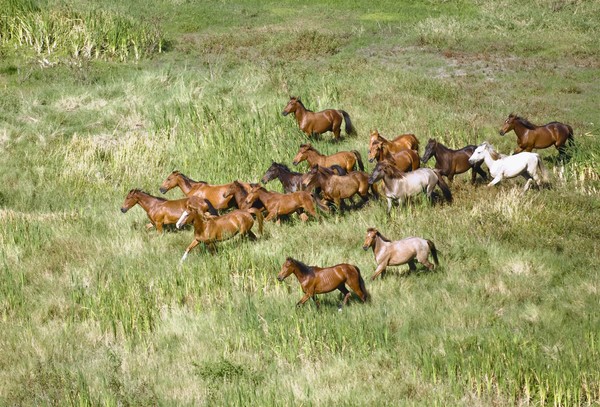The week that was, 12/6-12/2009
Posted on | December 13, 2009 | No Comments
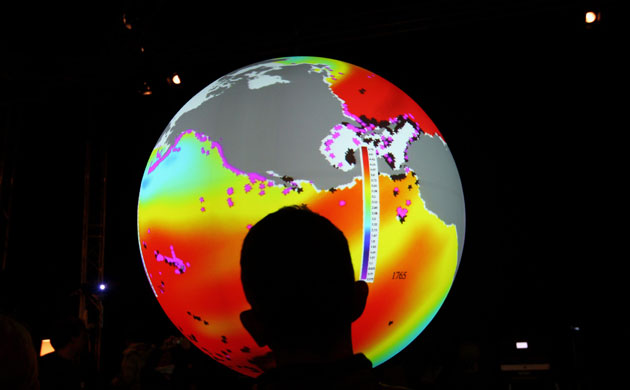
A man watches an animated projection showing the different acidity levels of the ocean. Photograph: Miguel Villagran/Getty Images. Click on the image to be taken to the London Guardian's "Copenhagen in pictures: Day two."
Most of us aren’t chemists, but it’s not hard to understand that a more acidic ocean will change what can live there. — Dave Kubiak, retired teacher and fisherman from Kodiak, Alaska, “Increasingly acidic ocean threatens fish,” Alaska Daily News, December 9, 2009
The ducks and geese bypass many of our area shallow lakes because of a lack of food, like wild rice in northern Minnesota and aquatic invertebrates in the small ponds. — “One lake at a time,” West Central Tribune, Wilmar, Minnesota, December 12, 2009

Helen Torr's “Heckscher Park," from "Long Island Moderns: Artists on the North Shore." Click on the image to be taken to the museum website.
“Honestly, I’m not saying we could not have done that, but I don’t think that’s the way it happened.” — Beverly Hills agribusiness billionaire Stewart Resnick when asked if he used political influence to challenge Endangered Species Act protections afforded to some fish, including Chinook salmon, in the Sacramento-San Joaquin Delta, “Major donor got Feinstein’s help on Delta plan,” San Francisco Chronicle, December 6, 2009
“I have known Mr. Resnick and his wife for many years, but if I did not think the review was in the best interests of California, I would not advocate for it.” — US Senator Dianne Feinstein, “Senator responds to water story,” San Francisco Chronicle, December 9, 2009, via Aquafornia
DiFi’s “explanation” is a thinly-veiled excuse for serving the needs of a big campaign contributor. — Economist David Zetland, “Speaking of bullshit,” Aguanomics, December 9, 2009
“The same people who told us to ignore Safe Drinking Water Act violations are still running the divisions.” — Anonymous source described as a “mid-level E.P.A. official,” “Millions in US drink dirty water, records show,” New York Times, December 7, 2009
“Our motto is, ‘If you think that you’ve got the best, put it to the test,’ which my mother made up.”– Steve Levy, executive director of the Maine Rural Water Association, “Solon tastes victory again in ‘Olympics of water’,” Portland Press Herald, December 10, 2009
“It isn’t going as well as planned.” — South Florida Water Management District director of environmental resource assessment Linda Lindstrom, “Wild horses elude capture, roaming restored land along Kissimmee River: Water managers have been trying to round up 20-plus mustangs since October,” South Florida Sun-Sentinel, December 12, 2009
“I would hope that Governor Riley and Governor Crist and I could have a group hug and we could agree on a water allocation between our three states.” — Georgia Governor Sonny Perdue, “Lake Lanier Georgia’s best option for drinking water,” Atlanta Journal-Constitution, December 11, 2009
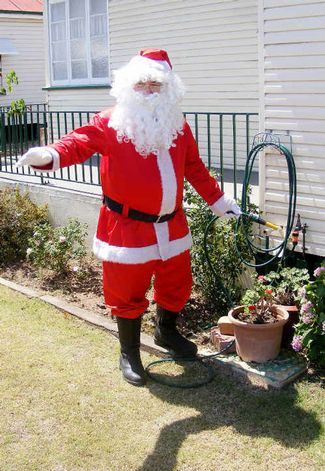
Due to water restrictions across the Southern Downs, there will be no running through sprinklers or hose and bucket fights on Christmas Day. — “Christmas water fights ruled out,” Warwick Daily News, Queensland, Australia, December 10, 2009
“It’s very, very rare.” — Glaciologist Neal Young, “Giant iceberg heading toward Australia,” Australian Antarctic Division, December 9, 2009
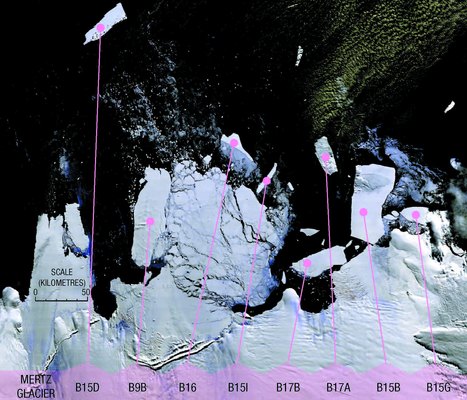
Speaking to presspersons after inaugurating a temple in Hassan taluk on Friday, Mr Gowda said the judiciary had given verdicts on the sharing of river waters, but unfortunately they remained on paper. — “Will to enforce court verdicts absent,” The Hindu, December 12, 2009
“There will be appeals.” — Jeffrey Kightlinger, general manager of the Metropolitan Water District of Southern California on the curious unraveling of the Quantification Settlement Agreement that removed pressure by Southern Californian cities on the Colorado River and the Imperial Irrigation District trades that made it possible, “Judge rules against landmark 2003 state water pact,” Los Angeles Times, December 12, 2009

“Be cutting edge.” — Bob Powers, deputy director of the Seattle Department of Transportation, offering advice to potential consultants and contractors on the Alaskan Way Viaduct, “Seattle seeks design for $225m waterfront seawall,” Seattle Times, December 9, 2009
There is a widespread view, particularly among environmentalists and liberals, that big businesses are environmentally destructive, greedy, evil and driven by short-term profits. — opinion piece by Jared Diamond, “Will big business save the Earth?” International Herald Tribune, December 6, 2009
“The public has been given no choice and is expected to subsidize the solution that gets the mines off the hook.” — Anthony Turton, “Water a worry for rights bodies,” Johannesburg Star, December 12, 2009, view by subscription or ProQuest
“The casing design and cementing of wells are orders of magnitude more important than knowing what’s in the secret sauce at fracturing companies.” — Charles Stanley, chief operating officer of the natural gas mining exploration group Questar Corp, “Process to ‘frack’ for gas draws debate,” Houston Chronicle, December 11, 2009

Victoria Switzer at her home in Dimock, Pa., where 13 water wells, including hers, are contaminated from chemicals used in the gas extraction process nicknamed "fracking." Photo: Fred R. Conrad / New York Times
“Can you imagine the ad? ‘Beautiful new home. Bring your own water. We’re like a dead zone here.” — Pennsylvania homeowner Victoria Switzer, “Dark side of a natural gas boom,” New York Times, December 7, 2009
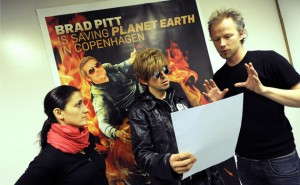
From Day Three of Copenhagen in Pictures in the London Guardian. The director Tue Biering (right) and assistant Marijana Jankovic (left) go through the script with a potential actor wearing a wig and sunglasses during the casting for a film called 'Brad Pitt is saving Planet Earth in Copenhagen.' Every day someone is chosen to act in one scene, culminating in 12 scenes making a movie which will be screened on the internet at the end of the climate conference Photograph: Adrian Dennis/AFP/Getty Images. Click on the image to be taken to the Guardian photo series.
“It’s like introducing piranhas to the Great Lakes. — Lake Erie fishing guide Pat Chrysler, “Asian carp raises fear and loathing,” AP / LaCrosse Tribune, December 10, 2009
“No.” — G. Dennis Cooke, a limnologist, professor emeritus at Kent State University and expert witness for the state of Oklahoma after being asked if he threw out evidence to better connect agricultural run-off to algal blooms, “Lake Tenkiller is low on oxygen, expert testifies,” Tulsa World, December 8, 2009
Thousands of dead fish are rotting on the river banks and hundreds more float on its surface, turning the area into a toxic cesspool. Vultures circle overhead, picking away at the rotting carcasses. Even an alligator – one of the fiercest reptiles of the Amazon – floats belly up in the river. — “Brazil’s river of death,” Al Jazeera English reporting on fish kills during an Amazon drought, presumed to be caused by El Nino, December 12, 2009
Substantial disagreement remains among the models as to the eventual peak strength of El Niño … At this point, it seems equally likely that El Niño will either strengthen further or remain at moderate strength. — El Nino Diagnostic Discussion, Climate Prediction Center, National Oceanic and Atmospheric Administration, December 10, 2009
Comments
Leave a Reply
